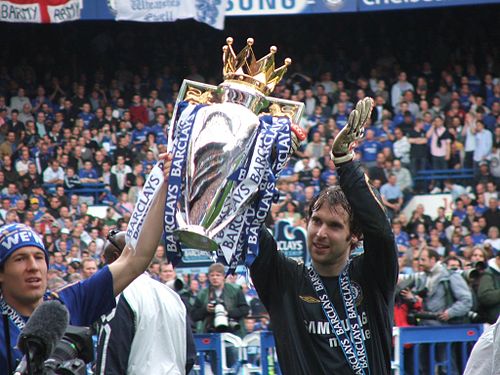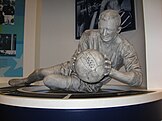Portal:Association football
| Main page | Categories & Topics | WikiProjects & Things you can do |
The Association football portal
Association football, commonly known as football, or soccer, is a team sport played between two teams of 11 players each, who primarily use their feet to propel a ball around a rectangular field called a pitch. The objective of the game is to score more goals than the opposing team by moving the ball beyond the goal line into a rectangular-framed goal defended by the opposing team. Traditionally, the game has been played over two 45-minute halves, for a total match time of 90 minutes. With an estimated 250 million players active in over 200 countries and territories, it is the world's most popular sport.
The game of association football is played in accordance with the Laws of the Game, a set of rules that has been in effect since 1863 and maintained by the IFAB since 1886. The game is played with a football that is 68–70 cm (27–28 in) in circumference. The two teams compete to get the ball into the other team's goal (between the posts, under the bar, and across the goal line), thereby scoring a goal. When the ball is in play, the players mainly use their feet, but may use any other part of their body, except for their hands or arms, to control, strike, or pass the ball. Only the goalkeepers may use their hands and arms, and only then within the penalty area. The team that has scored more goals at the end of the game is the winner. There are situations where a goal can be disallowed, such as an offside call or a foul in the build-up to the goal. Depending on the format of the competition, an equal number of goals scored may result in a draw being declared, or the game goes into extra time or a penalty shoot-out.
Internationally, association football is governed by FIFA. Under FIFA, there are six continental confederations: AFC, CAF, CONCACAF, CONMEBOL, OFC, and UEFA. Of these confederations, CONMEBOL is the oldest one, being founded in 1916. National associations (e.g. The FA or JFA) are responsible for managing the game in their own countries both professionally and at an amateur level, and coordinating competitions in accordance with the Laws of the Game. The most senior and prestigious international competitions are the FIFA World Cup and the FIFA Women's World Cup. The men's World Cup is the most-viewed sporting event in the world, surpassing the Olympic Games. The two most prestigious competitions in European club football are the UEFA Champions League and the UEFA Women's Champions League, which attract an extensive television audience throughout the world. Since 2009, the final of the men's tournament has been the most-watched annual sporting event in the world. (Full article...)
Selected article
The competition formed as the "FA Premier League" in 1992, following the decision of clubs in the Football League First Division to break away from the Football League to take advantage of a lucrative television rights deal. Since then it has progressed to become the world's most watched sporting league, and the most lucrative football league, with member club revenues totalling a figure in excess of £1.4 billion.
During the course of a season (which lasts from August to May) each of the 20 clubs play the others twice, once at their home stadium and once at that of their opponents for a total of 38 games for each club per season. (Full article...)
Selected biography
Named FWA Footballer of the Year for 1956, Trautmann entered football folklore with his performance in the 1956 FA (Football Association) Cup Final. With 15 minutes of the match remaining Trautmann suffered a serious injury after diving at the feet of Birmingham City's Peter Murphy. Despite his injury he continued to play, making crucial saves to preserve his team's 3–1 lead. His neck was noticeably crooked as he collected his winners' medal; three days later an X-ray revealed it to be broken.
Trautmann continued to play for Manchester City until 1964, making 545 appearances. In 2004 he was appointed an honorary Officer of the Order of the British Empire (OBE) for promoting Anglo-German understanding through football. (Full article...)
Selected association

The Fédération internationale de football association (French for 'International Association Football Federation'; abbreviated as FIFA and pronounced in English as /ˈfiːfə/ FEE-fə) is an international self-regulatory governing body of association football, beach soccer, and futsal. It was founded in 1904 to oversee international competition among the national associations of Belgium, Denmark, France, Germany, the Netherlands, Spain (represented by the Madrid Football Club), Sweden, and Switzerland. Headquartered in Zürich, Switzerland, its membership now comprises 211 national associations. These national associations must also be members of one of the six regional confederations into which the world is divided: CAF (Africa), AFC (Asia and Australia), UEFA (Europe), CONCACAF (North & Central America and the Caribbean), OFC (Oceania), and CONMEBOL (South America).
FIFA outlines several objectives in its organizational statutes, including growing association football internationally, providing efforts to ensure it is accessible to everyone, and advocating for integrity and fair play. It is responsible for the organization and promotion of association football's major international tournaments, notably the World Cup which commenced in 1930, and the Women's World Cup which began in 1991. Although FIFA does not solely set the laws of the game, that being the responsibility of the International Football Association Board of which FIFA is a member, it applies and enforces the rules across all FIFA competitions. All FIFA tournaments generate revenue from sponsorships; in 2022, FIFA had revenues of over US $5.8 billion, ending the 2019–2022 cycle with a net positive of US$1.2 billion, and cash reserves of over US$3.9 billion. (Full article...)
Did you know (auto-generated) -

- ... that Ecuadorian footballer Hernán Galíndez won a bicycle for beating a team featuring Lionel Messi when they were children?
- ... that goalkeeper Sophie Whitehouse, who has lived in England, Africa and the US, has been chosen to play soccer for the Republic of Ireland?
- ... that after his soccer career, Steve Palacios enlisted in the United States Army and played for the United States Armed Forces soccer team?
- ... that Carlton Town F.C., now competing at the eighth tier of the English football pyramid, was once denied promotion by a hat-trick scored by future England international Jamie Vardy?
- ... that Ryan Roberts, a defensive end for Notre Dame, was a soccer player in high school?
- ... that Welsh footballer Jon Morgan went on to become a college principal after retiring?
Selected image

Selected quote
General images -
Selected World Cup
The 1995 FIFA Women's World Cup, the second edition of the FIFA Women's World Cup, was held in Sweden and won by Norway, who became the first European nation to win the Women's World Cup. The tournament featured 12 women's national teams from six continental confederations. The 12 teams were drawn into three groups of four and each group played a round-robin tournament. At the end of the group stage, the top two teams and two best third-ranked teams advanced to the knockout stage, beginning with the quarter-finals and culminating with the final at Råsunda Stadium on 18 June 1995.
Sweden became the first country to host both men's and women's World Cup, having hosted the men's in 1958. (Full article...)Selected topic
|
8 articles | ||||
|---|---|---|---|---|
| ||||
More did you know -
- ... that when Irene del Río was called up to the Spain women's national football team squad, she was the only player who did not compete in the country's top division? (28 April 2021)
- ... that after winning the 2004 Football League Second Division play-off Final, some of the Brighton & Hove Albion players dropped the trophy while celebrating and damaged it? (2 March 2021)
- ... that a team including bricklayers, assistant bank managers and insurance clerks defeated Coventry City in the third round of the FA Cup in 1989? (5 April 2021)
- ... that the 2002 Football League Third Division play-off Final was one of the last matches shown on the ITV Sport Channel? (24 March 2021)
- ... that Claude Callegari gained cult-hero status among English football fans for his speeches about Arsenal? (24 April 2021)
- ... that thousands of football players are trafficked every year? (7 February 2021)
Association football portals
More sports portals
Associated Wikimedia
The following Wikimedia Foundation sister projects provide more on this subject:
-
Commons
Free media repository -
Wikibooks
Free textbooks and manuals -
Wikidata
Free knowledge base -
Wikinews
Free-content news -
Wikiquote
Collection of quotations -
Wikisource
Free-content library -
Wikiversity
Free learning tools -
Wiktionary
Dictionary and thesaurus








































